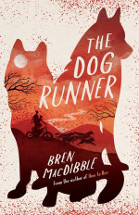The dog runner by Bren MacDibble

Allen and Unwin, 2018. ISBN 9781760523572.
(Age: Middle school) Highly recommended. Themes: Dystopia, Future,
Global warming, Climate change, Survival. In a bleak future where
the earth has run out of food and people are starving, Emery and his
little sister, Ella, hook their five dogs to a home made cart, like
a sled on wheels and set off for his mother's place where they
expect to be safe. Avoiding roads and other people, hiding when they
hear the approach of cars or bikes, they stumble on through the
heat, stopping to water the dogs and open another tin of fish, their
only food source. At a farm miles from the city a couple gives them
fruit and potatoes, but returning the next morning they find them
dead and their house burnt to the ground.
Their haste to leave sees them shot at by bikers and Emery is hit.
Ella gets away taking a gun with her and goes back to find Emery.
She hauls her wounded brother onto the cart and with the remaining
four dogs gets as far away as possible. Next day Wolf returns but
stays away from the group until Ella notices that the bikers have
put a tracker on him.
Once again they move off in a hurry determined to ride the next two
hundred kilometres before they are found. But one night the bikers
return and it is when Ella hears her mother's voice that she
realises that they are looking for them. But Mum is a captive of
these men and in helping them escape their clutches, leaves them
again to search for her husband.
This is a an exciting, heart in the mouth read as the two young
people try to find a place of refuge. Besieged by the ravages of
climate change, the novel could be about any refugee: fleeing war,
or violence or abuse or weather event - the impulse is the same, to
find shelter, a place where you feel safe. The cautionary tale
behind the survival story of Ella and Emery, that of the results of
our society, bent on using everything on the planet despite the
warnings, is made very real with its paddocks of brown earth where
crops once stood, walls between suburbs, suspicion and wariness,
reliance on guns and groups only out for themselves.
This novel would be a great class novel as it lends itself to a
range of discussion points with classes: refugees, cities, survival,
climate change, seed banks, over cropping, dogs and family.
Fran Knight